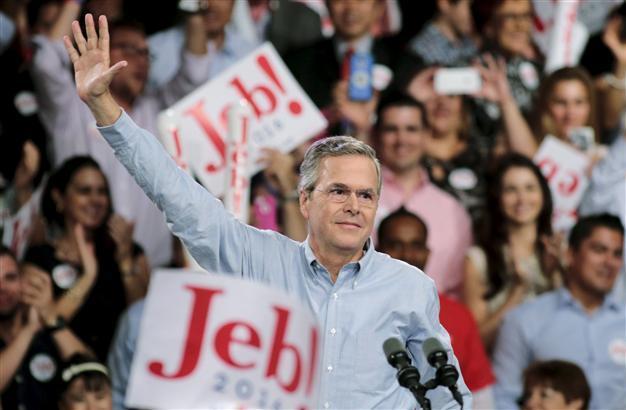Jeb Bush has optimistic message, faces challenges in '16 bid
MIAMI - The Associated Press

Republican U.S. presidential candidate and former Florida Governor Jeb Bush formally announces his campaign for the 2016 Republican presidential nomination during a kickoff rally in Miami, Florida in this June 15, 2015, file photo. REUTERS Photo
Former Florida Gov. Jeb Bush launched a White House bid months in the making with a vow to win the Republican presidential nomination on his own merits and stay true to his beliefs - easier said than done in a crowded primary contest where his conservative credentials will be sharply challenged.Bush is unquestionably one of the top-tier candidates in a large Republican field of 11 major candidates that lacks a true front-runner. Wisconsin Gov. Scott Walker and Ohio Gov. John Kasich are among those still deciding whether to join a field that could end up just shy of 20.
For Bush, the 2016 Republican contest will test both his vision of conservatism and his ability to distance himself from family.
"Not a one of us deserves the job by right of resume, party, seniority, family, or family narrative. It's nobody's turn," Bush said Monday, confronting critics who suggest he simply seeks to inherit the office already held by his father and brother. "It's everybody's test, and it's wide open - exactly as a contest for president should be."
Neither his father, former President George H.W. Bush, nor his brother, former President George W. Bush, attended June 15 announcement. The family was represented instead by Jeb Bush's mother and former first lady, Barbara Bush, who once said that the country didn't need yet another Bush as president, and by his son George P. Bush, recently elected Texas land commissioner.
Before the event, the Bush campaign came out with a new logo - Jeb! - that conspicuously leaves out the Bush surname.
Bush sought to turn the prime argument against his candidacy on its head, casting himself as the true Washington outsider while lashing out at competitors in both parties as being part of the problem. He opened his campaign at a rally near his south Florida home at Miami Dade College.
Bush said: "We are not going to clean up the mess in Washington by electing the people who either helped create it or have proven incapable of fixing it."
That was an indirect but unmistakable swipe at Republican presidential rivals in the Senate. Among them are his political protege, Florida Sen. Marco Rubio, as well as Sens. Ted Cruz of Texas and Rand Paul of Kentucky.
Paul said June 15 there's "Bush-Clinton fatigue" in America. "I think some people have had enough Bushes and enough Clintons," Paul said in an interview with The Associated Press.
Former Secretary of State Hillary Rodham Clinton is the clear favorite in the Democratic contest, setting up the possibility of another Bush-Clinton race following her husband Bill Clinton's victory over President George H.W. Bush in 1992.
Bush got in a jab at Clinton, saying, "The presidency should not be passed on from one liberal to the next."
Bush joins the race in progress in some ways in a commanding position, in part because of his family connections and support from the party establishment that has enabled him to raise what may be a record amount of money at this stage to support his candidacy. But on other measures, early public opinion polls among them, he has yet to break out, particularly in the early voting states of Iowa and New Hampshire.
In the past six months, Bush has made clear he will remain committed to his core beliefs in the campaign to come - even if his positions on immigration and education standards are deeply unpopular among the conservative base of the party that plays an outsized role in Republican primaries.
Mark Meckler, a leader of the ultraconservative tea party movement, said Bush's positions on education and immigration are "a nonstarter with many conservatives."
Yet a defiant Bush has showed little willingness to placate his party's right wing. Bush, whose wife is Mexican-born, addressed the packed college arena in English and Spanish, an unusual twist for a political speech aimed at a national audience.
He aimed his message on June 15 at the broader swath of the electorate that will ultimately decide the November 2016 general election. Minority voters, in particular, have fueled Democratic victories in the last two presidential elections.
He was not planning to address immigration on June 15, but protesters left him little choice. Just as he introduced his mother, a group of several people removed their outer shirts, revealing yellow T-shirts that spelled out, "Legal status is not enough."
Bush responded by departing from his prepared remarks: "Just so that our friends know, the next president of the United States will pass meaningful immigration reform, so that that will be solved - not by executive order."
He prefers creating a path to legal status for the millions of immigrants now living in the country illegally as part of an overhaul, rather than a path to U.S. citizenship as Clinton has advocated.
















